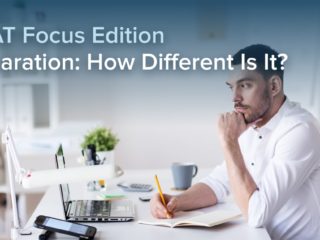| Getting your Trinity Audio player ready... |
Many GMAT students are unsure whether they should devote time to creating flashcards to use as study aids during their test preparation. In this article, we’ll look at the top 6 reasons why I recommend to all of my GMAT students that they create and regularly use flashcards. I will also provide some examples of how to most effectively use your GMAT flashcards.
I recommend to all of my GMAT students that they create and regularly use flashcards.
Here are the topics we’ll cover:
- Reason #1: Flashcards Are Beneficial for Both Verbal and Quant Study
- Reason #2: Flashcards Are a Versatile Learning Tool
- Reason #3: Flashcards Make It Easier to Squeeze in Study Time
- Reason #4: Flashcards Help You Stay Organized
- Reason #5: Flashcards Can Be Adapted to Your Study Needs
- Reason #6: Flashcards Keep You Interested in What You’re Studying
- Key Takeaways
- What’s Next?
Let’s begin by discussing how flashcards can help with both Verbal and Quantitative study.
Reason #1: Flashcards Are Beneficial for Both Verbal and Quant Study
You likely have heard that GMAT flashcards are an important tool for memorizing key GMAT Quant concepts. As we know, many formulas must be memorized to achieve a high GMAT Quant score. Flashcards isolate key formulas, allowing us to concentrate on them and form a mental picture of them. Take a look at our GMAT equation guide, and you’ll see that it is beneficial to memorize hundreds of quant concepts and formulas.
For example, in Properties of Numbers, you’ll need to memorize concepts such as:
- even/odd rules for addition and subtraction
- positive/negative rules for multiplication and division
In Exponents, you’ll need to memorize formulas such as:
- the multiplication rule of equal bases: (x^a)(x^b) = x^(a+b)
- the division rule of equal bases: (x^a)/(x^b) = x^(a-b)
The list goes on, but I think you get the point.
Just as flashcards are an excellent tool for improving Quant skills, so too are they a simple and effective way to drill important Verbal concepts. For example, you could use flashcards to memorize the common error types for each Critical Reasoning question type. By having many of the common error types memorized, you’ll be that much more prepared for Critical Reasoning on test day. For example, you might create flashcards for the 3 common cause-and-effect reasoning errors:
- sequencing
- co-occurrence
- mistaking correlation for causation
Again, these are just a few examples, but I think you get the point. Flashcards make memorizing key formulas and concepts much easier.
TTP PRO TIP:
You can effectively use flashcards to memorize both Quantitative and Verbal formulas and concepts.
Next, let’s discuss how flashcards are a versatile learning tool.
Reason #2: Flashcards Are a Versatile Learning Tool
Flashcards are one of the most adaptable study tools available to GMAT students because they can be customized to meet the specific needs of each student. For example, some students prefer to use handwritten paper flashcards or paper cards of different colors to track the difficulty level of GMAT formulas they’ve learned. In contrast, others prefer to print out computer-generated paper flashcards. Finally, other students appreciate the portability and convenience of digital flashcards.
I prefer handmade flashcards that I create using index cards. Sure, that method may be old school, but writing concepts and formulas in your own words helps ensure that you truly understand the concepts you’re learning. You think about the concepts as you write them down, thus reinforcing them even more.
Additionally, the use of flashcards allows you to change up your study routine. Not only are they a great way to study on your own, but also you can get your family or friends involved. Back when I was preparing for the GMAT, my girlfriend (now wife) would quiz me, using my stack of flashcards. Studying for the GMAT can be isolating, so finding a way to study for the GMAT while interacting with your loved ones is a definite win-win, and will keep you motivated to work towards your GMAT score goal.
TTP PRO TIP:
Incorporate variety into your study sessions by having friends or family members use your GMAT flashcards to quiz you on the material you’ve learned.
Next, let’s discuss how flashcards make it easier to study.
Reason #3: Flashcards Make It Easier to Squeeze in Study Time
Studying with GMAT flashcards allows you to study while on the go and fit in “quick hit” sessions whenever and wherever you want. Yes, your regular GMAT studying will generally be done while using your computer or iPad during the time that you have carved out of your daily schedule. However, we all live hectic lives, so any time that we can study for an extra 10 minutes here or 5 minutes there helps, right?
You can study during your commute, during your lunch break, or even while in line at the supermarket. Imagine fitting in an extra 20 minutes of studying every day by using your flashcards. That’s the equivalent of 20 x 7 = 140 minutes a week, or 140 x 4 = 980 minutes a month, which is around 16 hours of extra studying!
TTP PRO TIP:
Using your GMAT flashcards to conduct “quick-hit” study sessions while on the go is a great way to get in some extra study time.
Let’s now discuss the organizational benefits of flashcards.
Reason #4: Flashcards Help You Stay Organized
It’s simple to keep track of the math formulas and verbal concepts you’ve mastered and those you haven’t with GMAT flashcards. Simply divide your cards into “mastered” and “not mastered” piles. You’ll always know exactly what you need to study at any given time if you follow this foolproof method.
While you’ll want to spend the majority of your flashcard study time reviewing the material in the “not mastered” pile, flashcards also make it simple to dip back into the “mastered” pile to quiz yourself on material that you’ve already learned. Additionally, it is easy to put cards back into the “not mastered” pile if you find that you have become rusty on any particular concept.
Be strategic about which flashcards you look at and when. It would make sense to look at the “not-mastered” flashcards daily and the “mastered” flashcards maybe a few times a week, so you don’t allow concepts you’ve mastered to slip your mind.
TTP PRO TIP:
Divide your GMAT flashcards into two piles — “mastered” and “not mastered” — and devote more time to reviewing the “not mastered” pile.
Next, let’s discuss how to adapt flashcards to your needs.
Reason #5: Flashcards Can Be Adapted to Your Study Needs
When you begin your GMAT studying, I’m sure you will have some pretty “standard” flashcards to help you with some initial concepts. For example, for Quant, you may have a flashcard on the difference of 2 squares, as follows:
Front of Card:
Back of Card:
However, let’s say that in the course of your studying, you incorrectly answer the factored form of x^100 – y^100. Thus, it’s clear that you need some extra help with the difference of squares, right? So, rather than just reviewing the solution and moving on, add the problem you missed to the flashcard. By then studying that flashcard, you can ensure that you will never make the same mistake again. Your updated difference of squares flashcard would now be as follows:
New Front of Card:
New Back of Card:
You now have a super-effective flashcard because it addresses both the general formula and your specific knowledge gap related to the difference of two squares. So, don’t be afraid to update and add more detail to your flashcards.
TTP PRO TIP:
A generic flashcard can be modified to include specific examples of questions that you have answered incorrectly.
Let’s now discuss how flashcards can help you stay interested in your GMAT study.
Reason #6: Flashcards Keep You Interested in What You’re Studying
For your GMAT preparation to be effective, you must engage in active learning rather than passively ingest an endless stream of information. GMAT flashcards can assist you in becoming a more active learner.
Occasionally, you should shuffle your flashcards to provide your brain with an additional challenge. “Gamify” your flashcard study by seeing how many math concepts you can recall in a row or in a minute. Or even quiz your friends or family members on GMAT idioms to see how many they know.
Studying for the GMAT is a long and arduous process, and you must do everything in your power to stay motivated and make the process interesting. Bring your imagination to bear! Make studying for the GMAT more enjoyable by using GMAT flashcards. The more engaged you are in your learning, the greater the amount of information you will ultimately retain.
TTP PRO TIP:
To make GMAT preparation more challenging, more engaging, and more effective, “gamify” your flashcard study.
Key Takeaways
In this article, we have discussed several reasons to make flashcards part of your GMAT preparation strategy:
- Flashcards can help you with both Verbal and Quant study.
- Flashcards are a versatile learning tool.
- Flashcards help you fit in additional study time with “quick hit” study sessions.
- Flashcards are a useful tool for staying organized.
- Flashcards can be adapted to your study needs.
- Flashcards can help you stay interested in your GMAT studies.
What’s Next?
Now that you know how powerful flashcards can be as a study tool, get some additional tips for making the most of your GMAT Quant and Verbal preparation.



